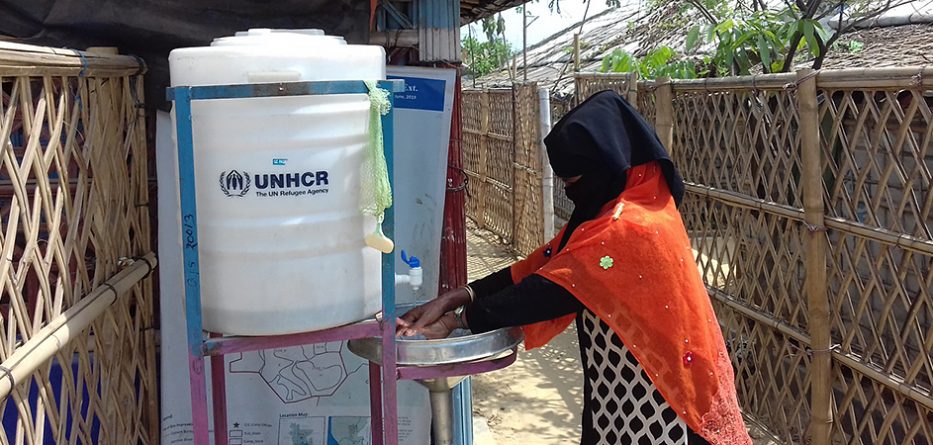There is no respite for over 1.3 million people needing humanitarian assistance in the densely populated Cox’s Bazar. On the back of Cyclone Amphan’s wrath, an imposing monsoonal season and the threat posed by COVID-19, the community is facing a triple threat and a catastrophic humanitarian crisis.
As restrictions start to ease in Australia, infections are slowly spreading in the camp. Two people have already died and there are 38 confirmed cases. The Rohingya, who fled persecution from nearby Myanmar to Bangladesh, are living in overcrowded conditions, negotiating a life that lacks all the essentials – food, clean water, proper sanitation, education and other services. Social distancing is almost impossible, with UNHCR data showing 93% of the population live below the emergency standard of 45 square metres per person.[1] Water, soap and masks also in short supply.
With regular internet outages, getting reliable information out to people about COVID-19 is challenging and rumours are rife. Caritas Australia and its in-country partners have been distributing emergency health promotion information, conducting prevention and preparedness training and providing Water Sanitation Hygiene (WASH) support – such as installing hand washing stations, soap and masks and cooked meals to people at serious risk. Caritas staff have also repaired toilets and water wells in the camp, provided emergency shelter support and repaired the bamboo bridges which aid access to the camp’s hospital. Emergency cash payments and multi-purpose grants will continue to those in need.
Eleanor Trinchera, Caritas Australia’s Program Coordinator for Bangladesh, Nepal and Philippines, says staff and volunteers are working tirelessly to shore up protection for the people against coronavirus.
“Caritas Bangladesh, on behalf of the Caritas network, continues to support the Rohingya, under challenging conditions, amid current restrictions. Health facilities in the camps are limited and some mid-term shelters managed by Caritas have been converted into additional quarantine sites to accommodate cases. Staff come to work every day, knowing that the work they do in the camps will save lives.” Eleanor says.
The Rohingya are extraordinarily and disproportionately affected by the combined conditions of overcrowded living, proximity to natural disasters, inadequate health and nutrition. Efforts to curb the spread of the virus are hampered by these issues.
Eleanor expresses her concern about this triple dilemma afflicting the people. Eleanor says, “I am deeply concerned about what is going on because of the congested situation in the camps and the fact that the monsoon is coming, which could aggravate the already challenging situation in the camps. Another major concern is the safety of the staff who are working under these conditions. However, I am confident that Caritas Bangladesh have Safeguarding and Protection guidelines in place to ensure everyone’s safety and wellbeing.
“Though there is still so much more to do, thanks to the generosity of our faithful supporters, we are working in solidarity with love and compassion to ensure nobody gets left behind in this emergency.” Eleanor says.
Year round, Caritas responds to humanitarian emergencies in around 23 countries providing immediate assistance to affected communities as well as long-term reconstruction. Caritas is one of the world’s largest and most effective emergency aid networks.
Your generosity empowers vulnerable communities to move forward beyond the challenges of the pandemic, with hope. Please make a tax time donation by June 30 at caritas.org.au/give.
With thanks to Caritas Australia.
[1] UNHCR Rohingya Refugee Emergency at a Glance








